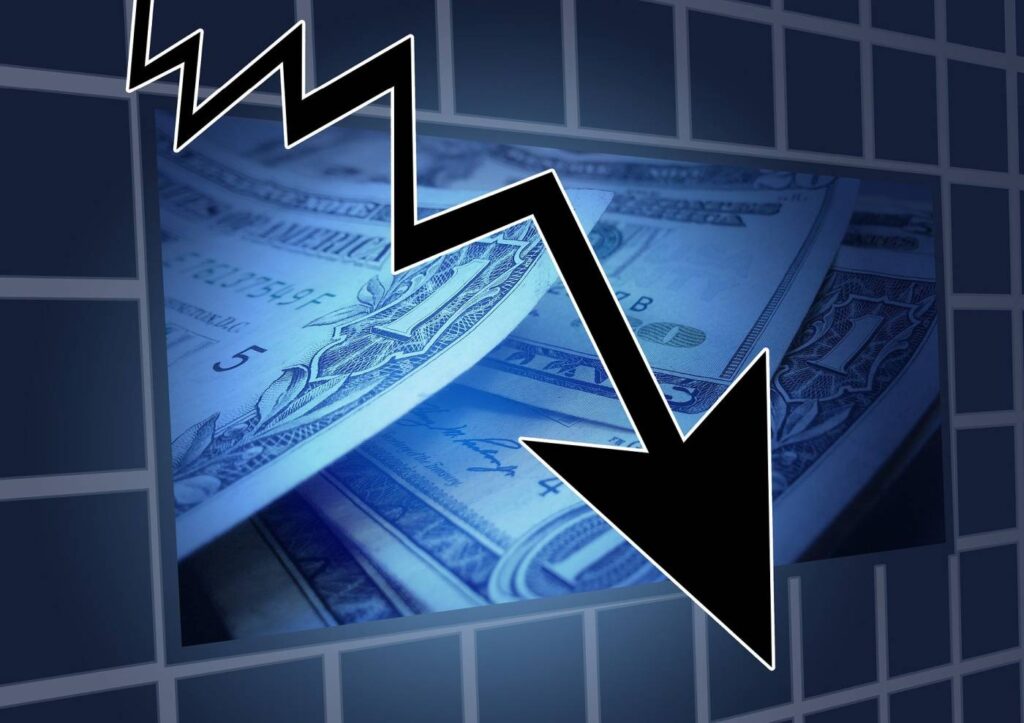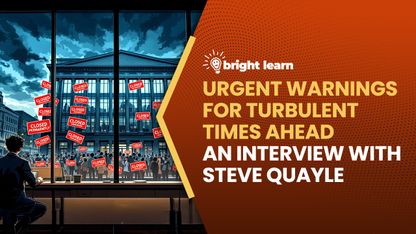
Prepping is all about being ready for the unexpected. It is about being ready for everyday emergencies, natural disasters and regional calamities that will put your life in danger, not to mention make it very complicated.
(Article by Tim Makay republished from ModernSurvivalOnline.com)
Most preppers will establish detailed plans and acquire all of the supplies and other gear that they need for confronting and enduring these events, big and small. But there are some threats to your life or overall well-being that will arrive without a clamor or any fanfare.

I am talking about economic collapse, a financial catastrophe that is statistically one of the most likely paradigm-shifting events that can happen to you, and unfortunately it is one that most preppers are ill-prepared for.
Watching the gears fly off of the economy is an ominous harbinger of financial misery and the general dissolution of society as we know it.
It is imperative that all preppers get ready for economic collapse, as it is only a matter of time until it occurs again, and any casual student of history will know it has already happened several times in prosperous nations throughout the 20th century.
But despite its seeming complexity it is possible to spot the warning signs of economic collapse if you know what to look for. Any good prepper knows that is the first step to getting prepared.
In today’s article we will be sharing with you eight sure signs that economic collapse is closing in.
Recognize the Signs Before it’s Too Late!
It is easy to understand why most people don’t treat the threat of economic collapse as anything they should be worried about, usually putting it up there with such fantastic events as major asteroid impacts, gamma ray strikes, and other catastrophic happenings that are so unlikely to occur you might as well not even worry about them.
Unfortunately for these misguided folks, economic collapse is not the stuff of fiction, and has already happened several times to extremely prosperous nations in the 20th century alone.
Like any other disaster, relying on good luck and hope is not a survival strategy for facing and enduring economic collapse.
Whether you are prepared or not, when it occurs your life is going to change and it almost certainly will not be for the better. Things you used to be able to count on as certain and many other things that you take for granted will become anything but, and probably for a long time to come.
Society will begin to fray at the edges and entire classes of people, millions and millions of citizens, will likely be dispossessed of their homes, vehicles and other possessions. Even the notion of three square meals a day will become anything but a certainty.
This is not something you can hide from, ignore or run from. You can’t just get out of the way of economic collapse like you would a natural disaster or a personal threat.
You must be prepared in ways that are atypical for preppers, and furthermore you must be able to see an economic collapse coming through the smoke screen of paid opinions, experts who are anything but and standard issue government obfuscation.
You don’t need a master’s degree in economics and you don’t need to be financially or mathematically inclined; you just need to pay attention and know what you are looking for.
The signs and symptoms of economic collapse are characteristic, inherent to it, just like any other ponderous major event. The section below will share with you the most intrinsic and the most important signs of pending economic collapse.
Learn to recognize them, keep an eye out for them and you’ll be able to react more quickly and accurately to the onset.
Economic Collapse: 8 Signs it is Close
Erratic Stock Market Activity
Contrary to the wild predictions and too-certain, calamitous prognostications put forth by motor mouth talking heads on every major news channel, the stock market activity that we see displayed in graphs, charts and rapidly scrolling text is itself not necessarily a great indicator of economic health.
The highs, lows, buying frenzies and selling rushes of the stock market are themselves directed by economic activity.
You would not be wise to base any of your decisions on what the markets are doing any given day, because they are so prone to manipulation and the spoofing of our perceptions.
However, stock market activity is valuable in another way for preppers, so long as we are paying attention to the general “tempo” and not what the talking heads are telling us.
Anytime you notice a pattern of incredible highs followed by equally incredible lows, or the rising and falling of the market without any determinable rhyme or reason this should inform you that investors and other financial bigwigs are making their own moves to prepare for what is coming. That means you should be, too!
Runaway Gov’t. Debt
If there was ever a certainty on this list it would be the government’s propensity for spending money they don’t have. Government debt only goes in one direction, and that is “bigger”.
Unfortunately, contrary to what the government will tell you, government debt is not good, will never be good, and cannot go on forever without consequence.
The government’s solution to running out of money has always been simply to print more, and this does nothing but drive up inflation. Additionally, the government has a favored strategy for dealing with deficits by “robbing Peter to pay Paul”, proverbially.
This will strain budgets already strained to bursting and continually pass on an ever-increasing tax burden to beleaguered citizens.
This is one symptom of pending economic collapse that is easy to overlook or ignore entirely because, as mentioned, the government is never debt free, seemingly.
Don’t be fooled! Federal rate adjustments, stoppages and other such meddling is a sign that they are running out of options and soon the house of cards will come crashing down.
Banks Increasing Risky Lending Practices
There is a reason the lower and middle classes typically despise bankers, and it is because banks, bankers and the consortiums that run them often have a hand in deliberately torpedoing an economy for their own gain.
History provides as many examples of this sort of behavior as you’d like, and we don’t need an exhaustive list right now. Suffice it to say that banks and their dodgy lending practices, particularly of the subprime mortgage variety, were one of the leading factors in the “Great Recession” of 2008.
Subprime lending is just one tool in the arsenal of duplicitous banks, and whatever form it takes, whatever name they call it, the end result is always the same: People getting access to vast sums of money for purchasing property with absolutely no hope of ever being able to pay it back.
At the inevitable end, the bank will be all too happy to kick people out of their vainly purchased homes, and take possession of it through foreclosure.
This mechanism more than any other is likely to be responsible for the mass generation of an entirely new category of homeless and dispossessed. Before you think for a second that the government would prevent something like this from happening again, consider that elite bankers often have elected government officials in their pockets, bought and paid for.
When you notice seemingly anomalous or ill-advised lending taking place, you’ll know we are already in trouble!
Mass Closure of Manufacturer and Retail Establishments
One of the most visually apparent and initially painful symptoms of pending economic collapse is the first steady and then rapid increase in the number of retail establishments, factories and other businesses closing up.
It is easy to understand why; as the economy starts to chug, people will become more frugal with what money they do have, and then there will be less money to go around all together.
With elective spending being sharply limited or cut off entirely and even spending on necessities being budgeted down to the last copper cent, businesses will start to lose out on profit. Once enough profit is lost employees will be let go and then eventually the business will fold.
These retail casualties are far from meaningless, however. Each and every position at each and every establishment is a job with a personal life attached to it. Now these people have even less to spend and even fewer prospects for getting a job. The cycle repeats and intensifies.
Pretty soon, businesses are contracting and then disappearing, one after the other. Now you will know we are properly looking at potential economic calamity.
Slow or No New Construction
When the economy is healthy and things are going well you will notice cranes in the sky. Cranes in the sky hoisting loads plus construction sites full of bustling workers is always a good sign, as it means people, businesses and other interests need room to expand into.
So long as people are building you can rest assured that the economy is moving more or less as it should be.
And the opposite is also true: A sharp downturn or even complete absence of construction means the economy is not healthy.
Worse yet, seeing construction of a building abandoned halfway finished usually means something truly terrible is on the horizon unless it is an isolated incident.
A nationwide or even regional downturn in construction is a surefire indicator that the economy is struggling, and perhaps soon to be on life support.
When you hear your friends and relatives in the construction business or trade jobs complaining about a near or total absence of work, it is time to get ready, and you should do the same thing when you notice a distinct lack of construction in otherwise populated and popular areas.
Major Increases in Unemployment
A pronounced increase of prolonged unemployment is an un-missable symptom of a severely struggling economy. This is something of a rider on one of the previous symptoms correlating with the widespread closure of businesses of all kinds.
The more people that are unemployed, the less money they will have to spend, and the less impetus is put into the economy to make everything function.
When unemployment starts to climb, you can also be assured that the government will be ready to make things worse with handouts, programs and other entitlements that will certainly feel good but will rarely if ever do good.
People who are incentivized to forgo work will, shockingly, not work and this mass entitlement spending will put the government in even more debt which will further destabilize an already unstable situation.
Unemployment rates should be low and stay that way in healthy, functional economies, and even middling but steady unemployment is cause for concern.
You should have noticed by now that many of these factors are interlinked, and the more that you plug in the more likely it is that total economic collapse can result.
Falling Family Incomes
Any family or household income must not only provide for all of the things that an individual or a family needs but also things that they just want if you want a truly robust, thriving economy.
More spending and more sectors means better economic health overall and anytime household income fails to keep up with inflation, much less fails to keep up with necessities, you’ve got a problem.
Now, it might not be a problem if a few people here and there are simply struggling to make ends meet, as sad as that is, because such disparities have always existed since the beginning of time.
However, when entire sectors of people are suffering from inadequate and falling household income levels, you might be looking at the beginning of the end as far as the economy is concerned.
This factor once again is connected with and fueled by other factors and reduced family income results from layoffs, reduced pay and other things that affect businesses and business owners. It is also exacerbated by the next factor on this list…
Wildly Increased Prices of Goods and Services
Probably the most visible and the most painful symptom of economic trouble and a pending economic collapse is either a slow, steady and seemingly endless increase in the price of everyday commodities and services or a stratospheric “moonshot” hike in the price of the same. Either is bad news, and terrifying for people who are already underwater.
Chances are this has already been happening for some time under the guise of inflation and you haven’t even noticed it. A few extra cents here, a few extra cents there at the grocery store or reduced portions in an identical packaging means your money is not going as far.
Everyone notices a $0.25 hike in the price of gas but very few notice an extra penny here or there.
The bottom line is that buying power of a given currency is degrading, and once this buying power diminishes enough and other factors take hold you will see once common and entirely affordable commodities rendered so expensive that people won’t, or can’t, buy them at any price.
This factor more than any other is likely to tear a society apart and usher in true economic collapse.
Conclusion
A good prepper is ready for all kinds of disasters and every sort of daily emergency. Since preppers have taken it upon themselves to keep their families and their interests safe from harm they must be equally invested in keeping the same safe from the ravages of economic collapse.
If you don’t know what to look for, economic collapse can strike without warning and plunge you into a life of poverty and austerity.
But, so long as you are adequately preparing yourself to face such an eventuality it is possible to see it coming when you know what to look for, an advantage that could make the difference.
Read more at: ModernSurvivalOnline.com and Bubble.news.
Please contact us for more information.























